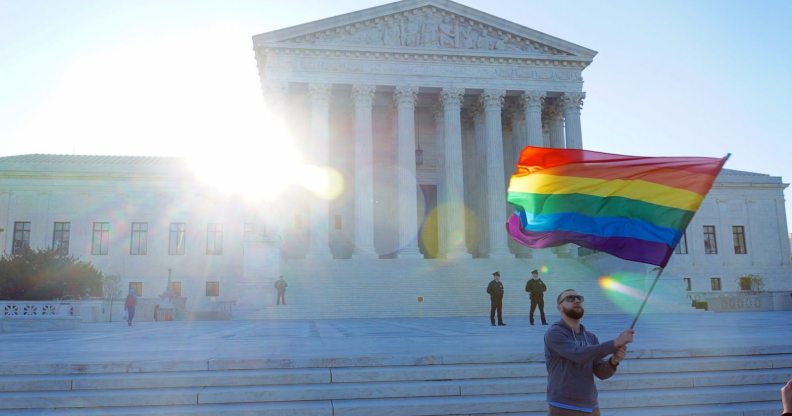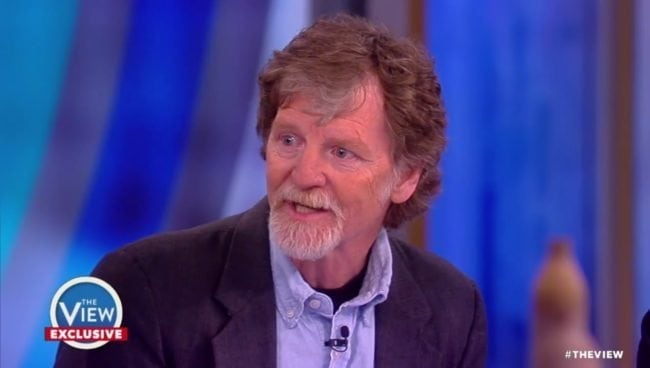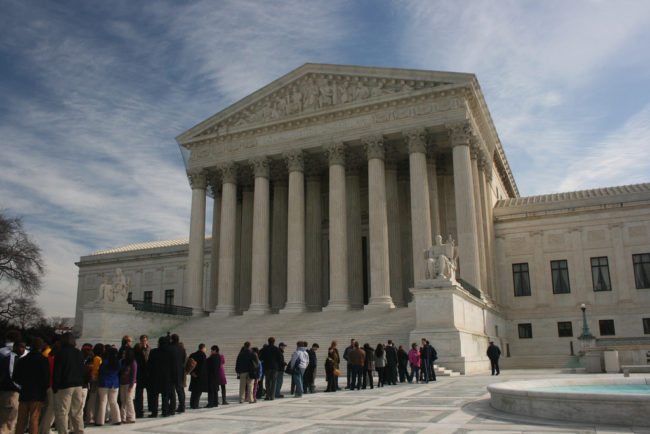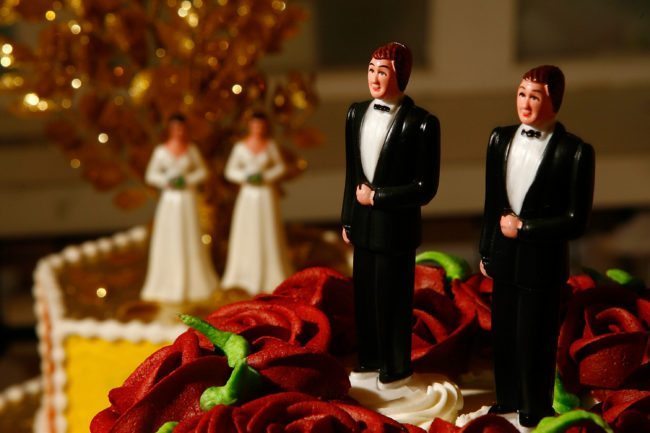US Supreme Court begins hearing case that could blow a hole in LGBT rights protections

The US Supreme Court will today hear a case that threatens to undermine anti-discrimination protections for LGBT people.
Today, the US Supreme Court is set to hear the case of a religious baker, represented by an evangelical law firm seeking to undermine state-level LGBT discrimination protections.
Jack Phillips of Colorado’s Masterpiece Cakeshop launched a legal challenge to state anti-discrimination laws after refusing to serve gay couple David Mullins and Charlie Craig.

The baker refused to make a cake for the couple after he found out they were celebrating their wedding
Mr Phillips claims that Jesus Christ would discriminate against gay people, and continues to insist his religion requires discrimination against gay people.
LGBT campaigners say that if the court sides with Mr Phillips, the case threatens to blow a hole in decades of civil rights laws and anti-discrimination protections across the US.
Trump’s Justice Department will deliver oral arguments as part of the baker’s defence, arguing that it has a “substantial interest” in the case to protect “free expression”.

(Creative Commons photo/Supermac1961)
The Human Rights Campaign said the case “will either protect the fundamental equality of LGBTQ people, or set a dangerous precedent giving businesses a license to discriminate”.
HRC President Chad Griffin said: “At its core, this case is a cynical effort to manipulate the First Amendment in order to provide a license to discriminate against LGBTQ people and our families.
“The Trump-Pence administration’s decision to back discrimination in this case is another attack in their all-out war against the LGBTQ community.
“At every turn, they have sought to undermine the civil rights of LGBTQ people. It’s crucial that the justices reject discrimination and stand on the side of fairness and equality.”
HRC Legal Director Sarah Warbelow added: “In the United States, businesses that are open to the public get to decide what to serve, but not who they serve. The First Amendment cannot and should not be distorted as a weapon of discrimination.
“The ramifications of allowing people to pick and choose who they will serve could have severe consequences not only for LGBTQ people, but other minorities as well. Such a decision would put into jeopardy long-standing laws against discrimination across the country.”

(Getty)
The baker is defended by hardline anti-LGBT law firm Alliance Defending Freedom, which has sought to undermine LGBT rights protections in a number of states .
Though the ADF is framing the issue around a religious objection to same-sex marriage, their other cases show a much wider support for licensing anti-LGBT discrimination.
For instance, they have sued a school district for putting in place a transgender non-discrimination policy, and defended a T-shirt printer who refused an order from a Pride celebration.
Sarah Kate Ellis, President and CEO of GLAAD, added: “The Department of Justice will pretend that this case is not about discrimination as they argue in front of the Supreme Court today, but that could not be further from the truth.
“While freedom of religion is paramount to our nation’s success, it does not give anyone the right to impose their beliefs on others, to harm others, or to discriminate.
“There is no sugar-coating the blatant and ugly agenda to discriminate against LGBTQ people at the core of this case, which is about seeking religious exemptions from non-discrimination laws for the singular purpose of refusing service to people simply because who they are.”

(Getty)
Of the case, GLAAD added: “In other commentaries, ADF staff members have pushed the notion that vendors like Mr. Phillips should be enthusiastic about an event if they are going to agree to work on it.
“Sure, it’s a nice idea. It’s also a legally meaningless one. In a perfect world, everyone who ever sells you anything, be it a good or a service or somewhere in-between, would be enamored with you and every aspect of your life.
“But a business owner’s excitement is an untenable standard, even more so for the business owners themselves than for the customers.”
It added: “One can discriminate ‘nicely’ or accommodate rudely, and it won’t change the issue.
“The issue is the discrimination or accommodation, not the smile or frown attached to those choices.
“It is silly to suggest that wedding professionals are somehow lacking in their job if they fail to make a ‘special and unique’ connection to a person who is paying them for their services.”
The American Civil Liberties Union and the ACLU of Colorado represent Mullins and Craig in the case.
James Esseks, director of the ACLU’s LGBT Project, said: “The law is squarely on David and Charlie’s side because when businesses are open to the public, they’re supposed to be open to everyone.
“While the right to one’s religious beliefs is fundamental, a license to discriminate is not.
“Same-sex couples like David and Charlie deserve to be treated with the same dignity and respect as anyone else, and we’re ready to take that fight all the way to the Supreme Court.”
86 Republican members of congress have also signed an amicus brief to the US Supreme Court supporting the baker’s right to discriminate, while the Democrats have largely sided with the gay couple.

